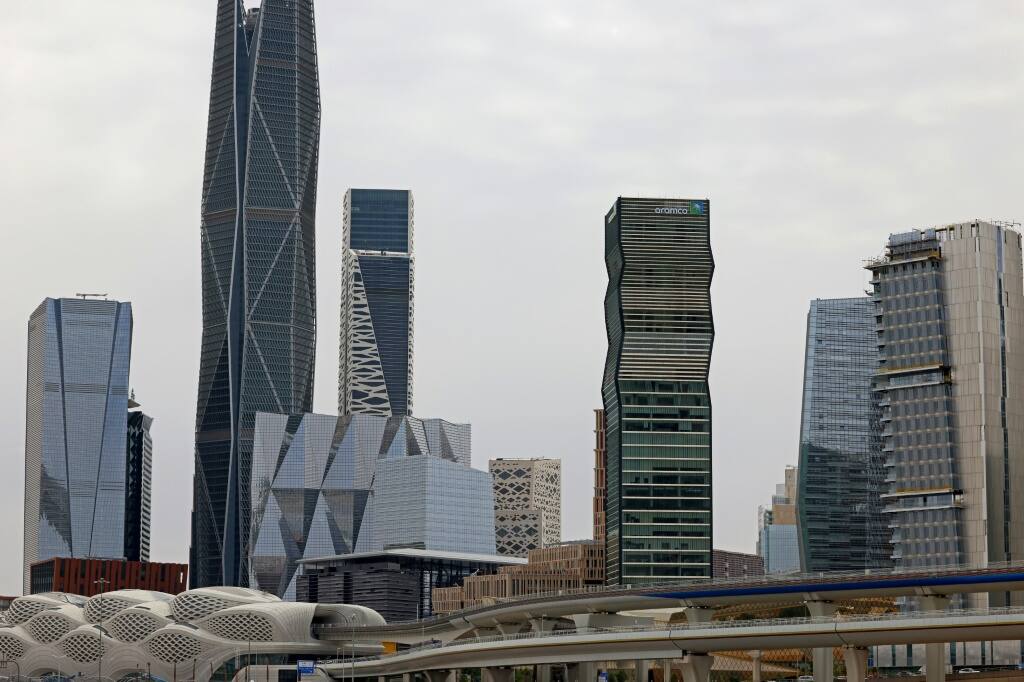Foreign firms race to open Saudi offices before deadline

A wave of ribbon-cutting ceremonies is sweeping the Saudi capital as multinationals face a January deadline to open regional headquarters in the Gulf kingdom or lose out on government contracts.
In what has become a common scene, executives in suits and Saudi officials in white robes gather to inaugurate the new offices, sipping Arabic coffee in a haze of incense smoke while singing the praises of last year's fastest-growing G20 economy.
Announced in February 2021, Saudi Arabia's regional headquarters (RHQ) programme is widely seen as a bid to compete with Dubai in the neighbouring United Arab Emirates, a favourite base for global firms with business in the Middle East.
Despite complaints from some executives that there remains a lack of clarity on key details of the Saudi programme, the January 1 deadline is holding, the Saudi investment ministry told AFP in a written response to questions.
"Multinational companies that are part of the RHQ Program will be well positioned to bid for projects funded by the Saudi Government," it said.
"Only multinational companies with regional headquarters in the Kingdom will be eligible for tenders and contracts floated by government entities."
So far, 162 regional headquarters licenses have been granted in sectors including pharmaceuticals, IT and construction, "with many others being processed", the ministry said.
The big question, analysts say, is whether participating firms are merely ticking a box to retain access to Saudi funds or genuinely embracing the government's vision of Saudi Arabia as the centre of the region.
The programme is "an early litmus test of the degree to which foreign businesses are prepared or willing to comply with and buy into Saudi initiatives, or whether they will seek workarounds that see them retain the majority of staff in the UAE and delegate a select few to Saudi," said Kristian Ulrichsen, a fellow at Rice University's Baker Institute.
It should also offer clues about the implementation of flagship projects such as a new airline and airport, and the $500 billion, futuristic mega-city known as NEOM, Ulrichsen said.
'Jumping through hurdles'
Riyadh defines a regional headquarters as an office that provides "strategic direction, management, and support services for company subsidiaries, branches, and affiliates in the (Middle East and North Africa) region", the investment ministry said.
One firm, IHG Hotels & Resorts, placed its new office on the 12th floor of a skyscraper in the capital's financial district, staffing it with 25 employees from departments including revenue management, sales, marketing, design and engineering.
IHG has been present in Saudi Arabia for nearly 50 years, actively bids for government projects including developments along the Red Sea Coast and plans to open 20 hotels across the kingdom in 2024 and 2025, Haitham Mattar, managing director for the Middle East and Southwest Asia, said during the office's ribbon-cutting ceremony in October.
But the company also has offices in Dubai and elsewhere in the region, and "we will continue with those offices", Mattar told AFP.
As for the process of establishing a Saudi regional headquarters, he acknowledged there were some kinks to work out.
"It took us a bit of time and jumping through hurdles to achieve our licence for this office. However we are there now which is great and that's what we're happy and positive about," he said.
"This is all new to Saudi Arabia, right? So we have to really be conscious of that. There's a lot of trial-and-error, there's a lot of perfecting some of the processes, and sometimes some of the processes have maybe one too many steps."
'Ambitious' targets
The investment ministry has touted benefits for firms setting up regional headquarters in Saudi Arabia, including the ability to apply for unlimited work visas and a 10-year waiver on quotas for hiring Saudi nationals.
But it has not specified what kind of tax relief the firms might receive, a major question for executives.
Laurent Germain, CEO of French construction engineering firm Egis Group, nevertheless told AFP he had no regrets about establishing a regional headquarters in Saudi Arabia last year, and that he advised other French firms to do the same.
"We've come into a situation where now it is in Saudi Arabia that we have the most activities in the Middle East, and probably so for the next 10 years. It was a natural step," he said.
Germain added that he did not necessarily see the regional headquarters programme in the context of a budding Riyadh-Dubai rivalry, but rather as a broader bid to hit "very ambitious" foreign investment objectives.
"They are taking all the measures they can to increase the attractiveness of the kingdom," he said.
Source: AFP
ncG1vNJzZmiaop6yp7jYZ5qoZqqWfKPB0qKlnqujYrKku82opLJnlZi8r7vMsmZqb2NugXV5xaipnqGXo3qntdGmqmaqkZiybrvPnqVmq5Gqsap5zp%2BdopuVqHqlscCdo6KmlWQ%3D